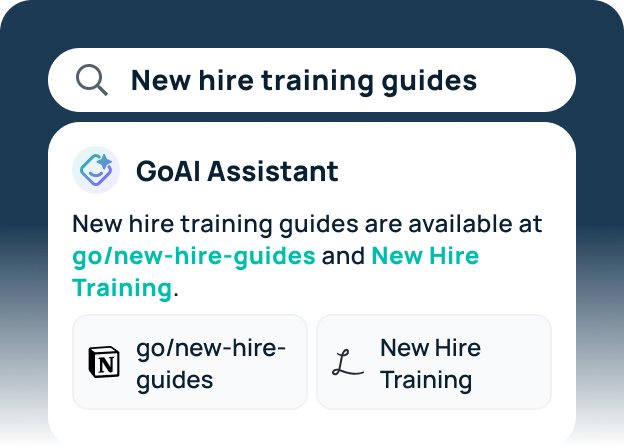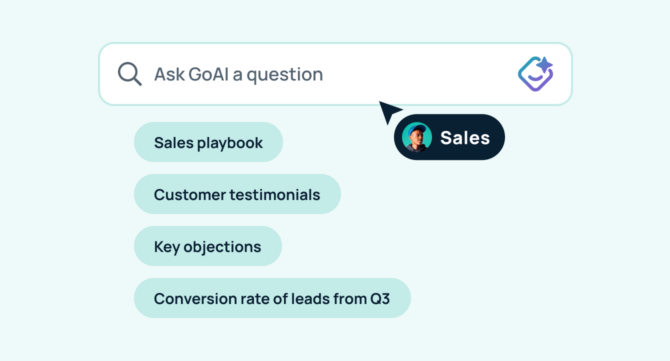Sales teams need immediate access to the right information to close deals, make informed decisions, and build meaningful relationships with prospects. Yet, navigating a large tech stack of customer data, product details, and market insights can be overwhelming. AI prompts for sales teams can help you work faster and smarter.
That’s where enterprise search tools (like GoSearch!) come in, and if you’re in sales, mastering the art of search prompts can be a game-changer.
In this article, we’ll explore how sales professionals can leverage enterprise search prompts within GoSearch to boost productivity and efficiency. We’ll share practical tips for creating tailored search prompts that cater to the unique needs of sales teams.
What is GoSearch, and how does it help sales teams?
GoSearch is an AI-powered enterprise search tool designed to help organizations streamline the process of finding critical information. Whether you’re searching through CRM data, product catalogs, sales playbooks, or internal documentation, GoSearch’s intuitive interface and advanced features make it easy to access the most relevant information quickly.
GoSearch for sales teams is especially valuable because it enables you to retrieve real-time insights about prospects, pricing, competitors, and more—all with a few well-crafted search prompts. With its natural language processing capabilities, GoSearch can understand complex queries and deliver targeted results that help you close deals faster.
Plus, our prompt library offers ready-to-use AI prompts that can jumpstart your workflow instantly.
Best practices for using enterprise search prompts
Crafting effective search prompts is essential to maximizing the benefits of enterprise search tools. By asking the right questions and using specific keywords, you can zero in on the exact information you need. Here are a few best practices:
- Be specific: Include product names, client industries, or locations to narrow down results.
- Use filters: Leverage date ranges, document types, and other filters to refine search results.
- Phrase queries as questions: Sales-specific questions often yield the most relevant answers.
- Test and refine: If your query or prompt doesn’t return the results you need, try modifying your parameters or including additional context.
Enterprise search AI prompts for sales teams
To help you get started, we’ve compiled a list of enterprise search prompt categories that sales professionals can use. Each category includes five practical prompt ideas to inspire your search queries. Try these AI prompts for sales teams today!
1. Customer information prompts
Understanding your prospects and existing customers is critical to closing deals. These prompts will help you find relevant customer data faster:
- “Summarize purchasing history for [Client] over the past [Time Period] segmented by [Product Category]. Include the sales channel used for each purchase”
- “Retrieve a list of clients in [Industry] who are due for contract renewal within the next [Time Period]. Segment the data by [Contract Type] and include the [Contract Expiration Date]”
- “Compile recent communications with [Client]. Organize the data by date to present a chronological view of interactions, and categorize each communication by [Topic]”
- “List key decision-makers at [Company] across various departments relevant to [Sales Opportunity]. Provide detailed profiles that include [Job Titles], [Contact Information] and [LinkedIn Profiles]”
- “Analyze recorded sales interactions with [Client] over the past 6 months. Include details on [Topics] during each interaction, such as product features, pricing, service options, or implementation timelines”
2. Product and pricing prompts
Quickly accessing product details and pricing structures can help you respond to inquiries in real time. Try these prompts to retrieve relevant product data:
- “Retrieve the most recent price list for [Product], including all available pricing tiers based on [Customer Segment]. Highlight any discounts or promotional pricing available”
- “Summarize a detailed product comparison between [Product A] and [Product B], focusing on both technical specifications and feature sets. Include a side-by-side analysis of [Key Features]”
- “Locate current discount policies for bulk purchases of [Product], focusing on the specific thresholds that trigger discounts. Include details on [Payment Terms]”
- “Analyze technical documentation for [Product], including any recent updates or revisions. Include a detailed overview of the [User Manual] that explains core features, functions, and troubleshooting”
- “Compile information on the available upgrades for [Product] clients, specifying the different types of upgrades that are currently being offered. Include an overview of [Upgrade Packages] or bundles”
3. Competitive analysis prompts
Sales teams benefit greatly from understanding their competition. Use these prompts to stay informed about the competitive landscape:
- “Summarize recent news and industry updates about [Competitor], including press releases, media coverage, or official statements released within the last [Time Period]”
- “Compile a detailed feature comparison between [Product] and [Competitor Product], focusing on key differentiators across various aspects such as functionality, pricing, performance, and customer experience”
- “Analyze how [Competitor] positions their solutions in the market. Include insights into the value propositions for [Customer Segment]”
- “Retrieve client feedback on [Competitor] over the past year. Categorize the feedback into themes such as product features, customer support, pricing, performance, ease of use, and overall satisfaction”
- “Locate market share reports comparing [Company Name] and [Competitor]. Pay special attention to any market shifts resulting from emerging trends, economic factors, or technological advancements”
4. Sales strategy prompts
Staying on top of sales strategies and internal resources helps ensure you’re working efficiently. These prompts help you access sales playbooks, processes, and tips:
- “Summarize sales playbook for [Product], focusing on strategies and tactics for engaging prospects, qualifying leads, and closing deals effectively”
- “Analyze the most common key objections encountered when selling [Product]. Categorize them by type and identify detailed explanations for each objection”
- “Retrieve sales strategies that have been specifically tailored to approaching [Industry] clients, including best practices for prospecting, qualifying, and closing deals within that sector”
- “Locate case studies on successful deals closed for [Product]. Retrieve data on the industries where these successful deals took place, and categorize them by factors such as company size and budget”
- “Compile customer journey maps outlining the sales cycle for [Product]. Break down the customer journey into key touchpoints”
5. Performance and reporting prompts
Tracking your performance and reviewing reports is essential to improving your sales game. Here are AI prompts for sales teams that will help you retrieve performance data:
- “Locate sales report for [Rep] this quarter. Retrieve information about the types of products or services sold, including the breakdown of sales by product line, feature, or solution type”
- “Retrieve a report on the performance of [Product] in the [Region] market over the last [Time Period]. Look for insights into customer feedback, satisfaction, and NPS specific to users of [Product]”
- “Analyze revenue generated from [Product A] over [Time Period]. Segment by customer type and compare against [Product B]”
- “Identify the top-performing sales representatives. Include the overall sales quota for each team member and how their performance compares to their individual targets”
- “Compile leads converted from [Campaign]. Compare the conversion rate of leads from [Campaign A] to [Campaign B] and outline key differences between the campaigns”
6. Generative prompts
With GoSearch’s generative AI features, you can instantly generate content that supports your sales activities. Here are five generative AI prompts for sales teams:
- “Draft a personalized follow-up email for [Prospect] after the initial product demo of [Product], including a summary of the key features discussed. Highlight how [Product] can provide solutions and add value to [Industry]”
- “Generate a proposal document for [Product] tailored to [Client] and [Industry]. Incorporate relevant case studies or client success stories from similar industries, and include an optional section on pricing structure with a breakdown of costs”
- “Create a detailed sales pitch for [Product], highlighting the key benefits specifically tailored for [Client’s Industry]. Target decision-makers within [Client’s Industry] and [Department], and include 4 key value propositions”
- “Draft a contract renewal email for [Client], clearly outlining the updated pricing, renewal benefits, and next steps. Use a professional and client-centric tone. Conclude with a call-to-action, guiding them on the renewal process”
- “Generate 3 response bullets addressing the [Objection] raised by [Prospect]. Each bullet should provide a clear, data-backed explanation that not only addresses the concern but also highlights the specific benefits of [Product]”
Explore more AI prompts for sales teams
The GoSearch AI prompt library is packed full of 200 AI prompts for every team in your organization. As a sales executive, you’ll get prompts for sales enablement, prospecting, objection handling, competitive positioning, account management, and more.
Explore the GoSearch AI prompt library for sales.
Ready to transform your sales process with GoSearch?
Take the guesswork out of finding crucial sales information. With GoSearch, your team can stay ahead of the competition and focus on closing more deals. Want to see GoSearch in action and try these AI prompts for sales teams?
Search across all your apps for instant AI answers with GoSearch
Schedule a demo

















